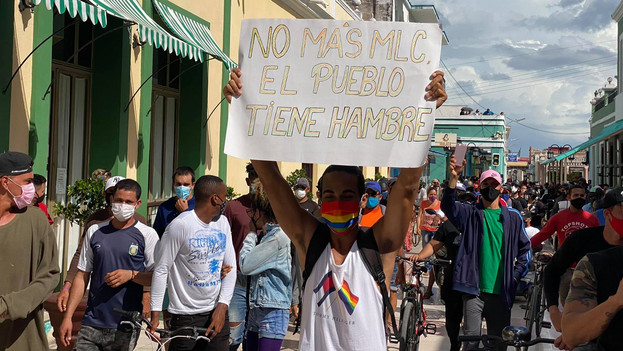
![]() 14ymedio, Reinaldo Escobar, Havana, 25 April 2022 — In a recent interview, Miguel Díaz-Canel, who holds the position of President of the Republic without the consent of the voters, stated that “in Cuba no person has been prosecuted for speaking against the Revolution.” He said more, but I will limit this comment to that phrase.
14ymedio, Reinaldo Escobar, Havana, 25 April 2022 — In a recent interview, Miguel Díaz-Canel, who holds the position of President of the Republic without the consent of the voters, stated that “in Cuba no person has been prosecuted for speaking against the Revolution.” He said more, but I will limit this comment to that phrase.
Although he answered the questions of his complacent interviewer, referring to the events of July 11, the leader of the Cuban communists should have been more explicit, if not more truthful.
What does Díaz-Canel understand by ‘speaking against the Revolution’?
The first question is whether “speaking” includes “writing”; the second is whether the concept changes when speaking into the microphones of a foreign or independent media outlet and whether the words are spoken in the presence of other people, say, in the public square. What if on the streets of Havana a young man displays a placard asking for freedom ?
Here we enter fully into the content. It seems that Díaz-Canel was never informed that distributing or talking about the Declaration of Human Rights was the reason for numerous imprisonments in Cuba; nor have they told him that, in 2003, 75 Cuban opponents were condemned to long sentences, people whose only fault was to express themselves against the ruling party’s policy.
The citations and threats to the mothers of young prisoners after the 11J [July 11th] trials so that they do not speak, so that they do not complain about the sentences; are these made by State Security without the knowledge of Díaz-Canel? Those who have been fined under Decree Law 370 for expressing themselves freely on the networks, did they go through any legal process before being sanctioned with a fine?
It would be tiresome to discuss the use of the term “Revolution” applied to a process that has already lasted 63 years and whose most urgent goal is to keep a party in power, but ignoring that detail and understanding the Revolution according to its proclaimed initial objectives, it would be necessary to clarify whether defending them, from a point of view other than that of the only party allowed, is also understood as “speaking against.”
Díaz-Canel limits himself to the alleged fact that no person has been prosecuted for speaking against the Revolution. And what about all those who for expressing themselves in a dissenting way are prohibited from leaving the country, have a State Security agent placed at the door of their building to prevent them from attending an event, are arrested and detained without mediation? Without a court proceeding? It is true that they have not been prosecuted, they have only been repressed.
I would applaud Díaz-Canel if he publicly promised to say that no Cuban will be repressed in any way because they express their discrepancies with the Communist Party’s policy, and do so wherever they do it and by whatever means they see fit.
Guilty of ignorance is any Cuban who does not know that oral or written expression that disagrees with the policy of the Communist Party entails different government reprisals, such as being fired from the workplace or thrown out of school, being denigrated in the official media without the right to reply, or being pushed by State Security agents to emigrate.
Guilty of cynicism is any Cuban who, knowing this truth, denies it.
____________
COLLABORATE WITH OUR WORK: The 14ymedio team is committed to practicing serious journalism that reflects Cuba’s reality in all its depth. Thank you for joining us on this long journey. We invite you to continue supporting us by becoming a member of 14ymedio now. Together we can continue transforming journalism in Cuba.
